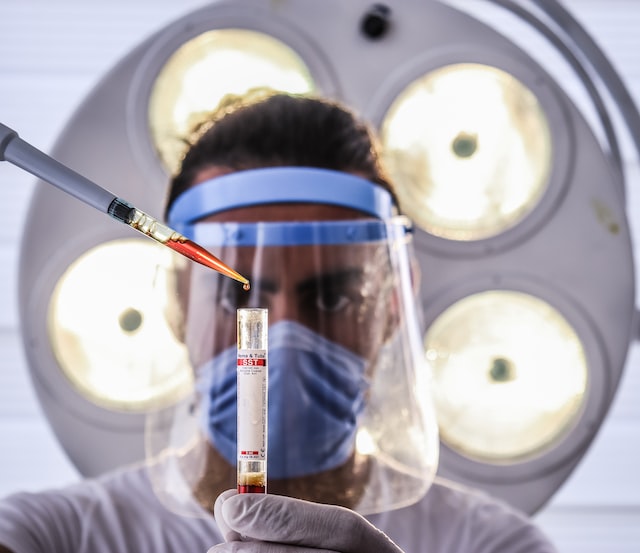Blood Test Before Hair Transplant: List Of All Tests Before Hair transplant and Why you need it

Though the hair transplant is a minimally invasive surgery, there is still a chance of complications. Also, not everyone is a good candidate for hair transplant surgery.
To select a good candidate and prevent the potential complication of hair transplant surgery, surgeons send some blood tests to evaluate the overall health of the patient.
Generally, you have to do a routine blood test before hair transplant surgery. However, surgeons might sometimes ask for special blood tests depending on your medical history.
So, what are the blood tests that you have to do before hair transplant surgery, and why? Is it necessary to do all these tests? Can you do a hair transplant without having a blood test? Find out.
What are the tests done for hair transplants?
Some routine blood tests for hair transplant are Random blood sugar, Complete blood count (CBC), Prothrombin time (PT), Bleeding time, Test for HIV, Hepatitis C, and Hepatitis B, and ECG( Electrocardiogram) if the patient is old age, or have high blood pressure.
Here is the list of all the blood tests that you should do before a hair transplant and why you need to do them:
#1 To test the sugar level in your body
The optimum level of sugar in the blood is very crucial for the success of a hair transplant. Sugar level increases the chance of infection and decreases the blood supply to the newly transplanted hair follicle.
To check the status of blood sugar level in the body surgeon send tests such as random blood sugar and HbA1c, which will show so the average level of sugar in the blood for 3 months.
If you have a high blood sugar level or diagnosed with diabetes, first, you need to control the sugar level before proceeding to hair transplant surgery.
Recommended reading: Can a person with diabetes have hair transplant?
# 2 Serology
HIV, Hepatitis B, and Hepatitis C are some of the common diseases that it is is transmitted when someone comes in contact with the blood of a diseased person.
The surgeon who performs hair transplant surgery might get this disease if they have a prick injury or when come in contact with the blood of the patient.
Due to this reason, you need to have a blood test for HIV hepatitis B, and Hepatitis C viruses before hair transplant surgery.
#3 Coagulation tests
Uncontrolled bleeding during surgery is one of the nightmares that a surgeon feared most.
Even if a hair transplant is not a major surgery, still you need to have a blood test to find out that you have a normal coagulation profile, which means your body can control bleeding on its own.
Prothrombin time/ International normalized ratio (PT/INR), bleeding time, clotting time, or APTT are some of the routinely done coagulation tests.
Note: In some cases, you may have to do thyroid profile tests, hormone tests, and iron profile tests to find out the cause of the hair transplant.
Besides these blood tests, you may have to do these additional tests before hair transplant surgery:
#1 Covid- PCR
Some hair transplant Institute demand Covid PCR before surgery. Or, they may only ask for a vaccination certificate.
#2 (Electrocardiogram)ECG
An electrocardiogram is a simple to test that shows the electrical activity of the heart. By analyzing the waveform of electrocardiograms one can diagnose heart diseases.
It is mainly done in old individuals or a person suffering from high blood pressure.
#3 Blood pressure
A person with high blood pressure is not a good candidate for hair transplant surgery. During high blood pressure, there is an increased chance of bleeding.
You need to take medication or control your diet to lower your blood pressure before hair transplant surgery.
Recommended reading: What are the effects of high blood pressure in hair transplant sugery?
Why blood tests are done before hair transplants?
Hair transplantation is safe and effective treatment for hair loss, but like any surgical procedure, it requires a thorough preoperative evaluation, which includes blood tests. These tests play a critical role in ensuring the safety and success of the surgery.
Firstly, blood tests provide a comprehensive overview of the patient’s general health status. They can help identify any underlying conditions that may affect the safety or efficacy of the procedure. For instance, liver or kidney disorders, diabetes, or anemia can complicate the surgery or recovery process.
Secondly, blood tests are conducted to assess the coagulation profile of the patient. Coagulation tests, like Prothrombin Time (PT), International Normalized Ratio (INR), and Partial Thromboplastin Time (PTT), give insights into the blood’s clotting capacity. If a patient’s blood does not clot properly, they may experience excessive bleeding during the surgery, which can lead to complications.
Thirdly, blood tests are used to check for any infections. This is crucial because any active infection in the body can heighten the risk of post-surgical infections. Common tests include a complete blood count (CBC), which can flag signs of infection, inflammation, or other abnormal immune responses.
Additionally, blood tests are done to ascertain the patient’s electrolyte balance. Imbalances in electrolytes can affect nerve and muscle function and could impact the body’s response to anesthesia and post-operative healing.
Testing for HIV, Hepatitis B, and Hepatitis C is also typically part of the preoperative evaluation. These conditions can potentially affect wound healing and immune response, and knowing a patient’s status allows the surgeon to take any necessary precautions to protect both the patient and the medical staff.
It’s also important to mention that some patients may have an undiagnosed condition that could affect their surgery or recovery. By conducting a thorough blood test, doctors can catch these conditions before surgery, reducing the risk of unexpected complications.
Lastly, blood tests can also provide information about the patient’s nutritional status. For example, deficiencies in vitamins, iron, or other nutrients can interfere with wound healing and recovery. If deficiencies are found, patients can work with their doctors to correct them before the surgery, increasing the chances of a successful procedure and smooth recovery.
Bottom Line
Conducting blood tests before hair transplant surgery is a crucial step in ensuring the patient’s safety and the success of the procedure.
By providing valuable insights into the patient’s overall health, blood clotting abilities, nutritional status, and more, these tests allow the surgeon to make informed decisions and take necessary precautions.
Therefore, they are an integral part of the preparation for hair transplantation.






